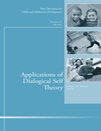Research Article
Multicultural adolescents between tradition and postmodernity: Dialogical Self Theory and the paradox of localization and globalization
Abstract
This chapter builds on Dialogical Self Theory to investigate the identity development of adolescents growing up in multicultural societies. Their cultural identity is not only compounded by the rapid cultural changes associated with globalization, but also by the paradoxical revival of cultural traditions which the large-scale compression of time and space has incited at local levels of society. Dialogical Self Theory, which is based on the metaphor of the self as a “society of mind,” helps to understand the dilemmas of tradition and postmodernity, of localization and globalization, within the self of individual youngsters. © 2012 Wiley Periodicals, Inc.
REFERENCES
- Anae, M. (1997). Towards a NZ-born Samoan identity: Some reflections on “labels.” Pacific Health Dialog, 4(2), 128–137.
- Anae, M. (2001). The new “Vikings of the sunrise”: New Zealand-borns in the Information Age. In C. Macpherson, P. Spoonley, & M. Anae (Eds.), Tangata O Te Moana Nui: The evolving identities of Pacific peoples in Aotearoa/New Zealand (pp. 101–121). Palmerston North, NZ: Dunmore Press.
- Appadurai, A. (1996). Modernity at large: Cultural dimensions of globalization. Minneapolis, MN: University of Minnesota Press.
- Bakhtin, M. M. (1929/1984). Problems of Dostoevsky's poetics. ( C. Emerson, Ed. & Trans.; W.C. Booth, Intro.). Minneapolis, MN: University of Minnesota Press.
- Bakhtin, M. M. (1981). The dialogical imagination: Four essays. ( M. Holquist, Ed.; C. Emerson & M. Holquist, Trans.). Austin, TX: University of Texas Press.
-
Gardiner, M. (1992). The dialogics of critique: M. M. Bakhtin and the theory of ideology. London, UK: Routledge.
10.4324/9780203203828 Google Scholar
- Goss, J., & Lindquist, B. (2000). Placing movers: An overview of the Asian-Pacific migration system. The Contemporary Pacific, 12(2), 385–414.
- Gressgård, R. (2010). Multicultural dialogue: Dilemmas, paradoxes, conflicts. New York, NY: Berghahn.
- Hannerz, U. (1992). Cultural complexity: Studies in the social organization of meaning. New York, NY: Columbia University Press.
- Herdt, G., & Leavitt, S. C. (1998). Introduction: Studying adolescence in contemporary Pacific island communities. In G. Herdt & S.C. Leavitt (Eds.), Adolescence in Pacific island societies (pp. 3–26). Pittsburgh, PA: University of Pittsburgh Press.
- Hermann, E. ( Ed.). (2011). Changing contexts—shifting meanings: Transformations of cultural traditions in Oceania. Honolulu, HI: University of Hawai'i Press.
- Hermans, H. J. M. (2002). The dialogical self as a society of mind. Theory and Psychology, 12(2), 147–160.
- Hermans, H. J. M., & Dimaggio, G. (2007). Self, identity, and globalization in times of uncertainty: A dialogical analysis. Review of General Psychology, 11(1), 31–61.
-
Hermans, H. J. M., & Hermans-Konopka, A. (2010). Dialogical Self Theory: Positioning and counter-positioning in a globalizing society. Cambridge, UK: Cambridge University Press.
10.1017/CBO9780511712142 Google Scholar
- Hermans, H. J. M., & Kempen, H. J. G. (1993). The dialogical self: Meaning as movement. San Diego, CA: Academic Press.
- Hermans, H. J. M., & Kempen, H. J. G. (1998). Moving cultures: The perilous problems of cultural dichotomies in a globalizing society. American Psychologist, 53(10), 1111–1120.
- Hermans, H. J. M., Kempen, H. J. G., & Van Loon, R. J. P. (1992). The dialogical self: Beyond individualism and rationalism. American Psychologist, 47(1), 23–33.
- Ibrahim, A. (2008). The new flâneur: Subaltern cultural studies, African youth in Canada and the etiology of in-between. Cultural Studies, 22(2), 234–253.
- James, W. (1890). The principles of psychology (Vol. 1). London, UK: Macmillan.
- Jolly, M. (1992). Specters of inauthenticity. The Contemporary Pacific, 4(1), 49–72.
- Jourdan, C. (1995). Masta Liu. In V. Amit-Talai & H. Wulff (Eds.), Youth cultures: A cross-cultural perspective (pp. 202–222). London, UK: Routledge.
- Kinnvall, C., & Lindén, J. (2010). Dialogical selves between security and insecurity: Migration, multiculturalism, and the challenge of the global. Theory and Psychology, 20(5), 595–619.
-
Lee, H. M. (2003). Tongans overseas: Between two shores. Honolulu, HI: University of Hawai'i Press.
10.1515/9780824846534 Google Scholar
- Lee, H. M. (2004). All Tongans are connected: Tongan transnationalism. In V. S. Lockwood (Ed.), Globalization and culture change in the Pacific Islands (pp. 133–148). Upper Saddle River, NJ: Pearson Prentice Hall.
- Macpherson, C., Spoonley, P., & Anae, M. (Eds.). (2001). Tangata O Te Moana Nui: The evolving identities of Pacific peoples in Aotearoa/New Zealand. Palmerston North, NZ: Dunmore Press.
- Meyer, B., & Geschiere, P. (Eds.). (1999). Globalization and identity: Dialectics of flow and closure. Oxford, UK: Blackwell.
-
Nilan, P., & Feixa, C. (Eds.). (2006). Global youth? Hybrid identities, plural worlds. London, UK: Routledge.
10.4324/9780203030523 Google Scholar
- Raggatt, P. T. F. (2010). The dialogical self and thirdness: A semiotic approach to positioning using dialogical triads. Theory and Psychology, 20(3), 400–419.
- Rata, E. (2011). Theoretical claims and empirical evidence in Maori education discourse. Educational Philosophy and Theory, 43(4), 1–13.
- Small, C. (1997). Voyages: From Tongan villages to American suburbs. Ithaca, NY: Cornell University Press.
- van Meijl, T. (2002). Culture and crisis in Maori society: The tradition of other and the displacement of self. In E. Kolig & H. Mückler (Eds.), Politics of indigeneity in the South Pacific: Recent problems of identity in Oceania (pp. 47–71). Hamburg, Germany: Lit Verlag.
- van Meijl, T. (2006). Multiple identifications and the dialogical self: Maori youngsters and the cultural renaissance. Journal of the Royal Anthropological Institute, 12(4), 917–933.
-
van Meijl, T. (2010). Anthropological perspectives on identity: From sameness to difference. In M. Wetherell & C. T. Mohanty (Eds.), The Sage handbook of identities (pp. 63–81). London, UK: Sage.
10.4135/9781446200889.n5 Google Scholar
- van Meijl, T. (2012). Multiculturalism, multiple identifications and the dialogical self: Shifting paradigms of personhood in sociocultural anthropology. In H. J. M. Hermans & T. Gieser (Eds.), Handbook of Dialogical Self Theory (pp. 98–114). Cambridge, UK: Cambridge University Press.
- Vestel, V. (2009). Limits of hybridity versus limits of tradition? A semiotics of cultural reproduction, creativity, and ambivalence among multicultural youth in Rudenga, East Side Oslo. Ethos, 37(4), 466–488.




